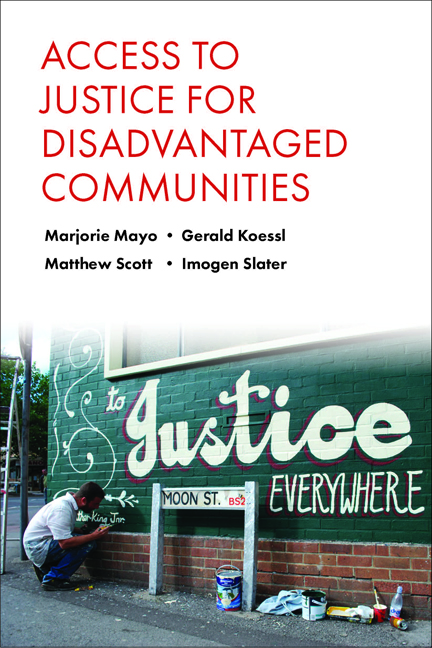Book contents
- Frontmatter
- Dedication
- Contents
- Acknowledgements
- Abbreviations and glossary
- Introduction: accessing social justice in disadvantaged communities
- one Social justice and the welfare state
- two Concepts of justice and access to justice
- three Ethos and values
- four Challenges and dilemmas
- five Public service modernisation, restructuring and recommodification
- six Conflict and competition versus collaboration and planning
- seven Public service modernisation and time
- eight Alienation and demoralisation, or continuing labours of love?
- nine Access to social justice for disadvantaged communities: value and values
- Appendix 1 Research methodology and questionnaire
- Appendix 2 Law Centres included
- Appendix 3 Topic guides for semi-structured interviews
- References
- Index
one - Social justice and the welfare state
Published online by Cambridge University Press: 01 February 2022
- Frontmatter
- Dedication
- Contents
- Acknowledgements
- Abbreviations and glossary
- Introduction: accessing social justice in disadvantaged communities
- one Social justice and the welfare state
- two Concepts of justice and access to justice
- three Ethos and values
- four Challenges and dilemmas
- five Public service modernisation, restructuring and recommodification
- six Conflict and competition versus collaboration and planning
- seven Public service modernisation and time
- eight Alienation and demoralisation, or continuing labours of love?
- nine Access to social justice for disadvantaged communities: value and values
- Appendix 1 Research methodology and questionnaire
- Appendix 2 Law Centres included
- Appendix 3 Topic guides for semi-structured interviews
- References
- Index
Summary
Before exploring the role of the law, and access to legal advice and advocacy as the background to the study of Law Centres, this chapter summarises the framework of earlier debates (Marshall, 1950; Titmuss, 1968) on social citizenship and the welfare state. How did some of these debates conceptualise public policy interventions to promote social rights such as rights to education, health, welfare and social security, and what were the implications for access to justice? These approaches have been challenged from differing perspectives over time, as the chapter illustrates, setting the context for more recent debates as these relate to subsequent chapters. The chapter concludes by summarising recent debates on marketisation and on public service modernisation agendas more generally, and their potential impacts on public service professionals. This sets the framework for the discussion of social justice and the provision of legal aid in the following chapter.
Social justice and the origins of the post-war welfare state
Even before the end of the Second World War, access to justice figured in discussions about how to build upon previous welfare reforms. As Baroness Hale pointed out in her Sir Henry Hodge Memorial Lecture for the Law Society in 2011, ‘when the [post-war] Welfare State was established in the United Kingdom after the Second World War, a legal aid and advice scheme was an important part of it’ (Hale, 2011, p 6). She quoted E.J. Cohn, who wrote in 1943 that
Legal aid is a service which the modern state owes its citizens as a matter of principle … Just as the modern State tries to protect the poorer classes against the common dangers of life, such as unemployment, disease, old age, social oppression, etc., so it should protect them when legal difficulties arise. Indeed the case for such protection is stronger than the case for any other form of protection. The State is not responsible for the outbreak of epidemics, for old age or economic crises. But the State is responsible for the law. (Cohn, 1943)
This emphasis upon social protection was central to the thinking behind the 1942 Beveridge Report, with its emphasis upon identifying the major causes of, and so preventing, poverty and social distress (through state-organised insurance schemes to provide pensions, sickness and unemployment benefits, for example).
- Type
- Chapter
- Information
- Access to Justice for Disadvantaged Communities , pp. 9 - 18Publisher: Bristol University PressPrint publication year: 2014



